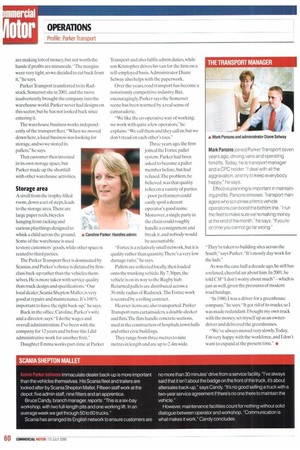OPERATIONS Profile: Parker Transport
Page 60

If you've noticed an error in this article please click here to report it so we can fix it.
are making lots of money, but not worth the hassle if profits are minuscule. "The margins were very tight, so we decided to cut back from it," he says.
Parker Transport transferred to its Radstock, Somerset site in 2001, and the move inadvertently brought the company into the warehouse world. Parker never had designs on this sector, but he has not looked back since entering it.
The warehouse business works independently of the transport fleet. "When we moved down here, a local business was looking for storage, and so we stored its pallets," he says.
That customer then invested in its own storage space, but Parker made up the shortfall with other warehouse activities.
Storage area
A stroll from the trophy-filled room, down a set of steps,Ieads to the storage area.There are large paper reels, bicycles hanging from racking and curious playthings designed to whisk a child across the ground. A Caroline Park Some of the warehouse is used to store customers' goods, while other space is rented to third parties.
The Parker Transport fleet is dominated by Scanias, and Parker's choice is dictated by firstclass back-up rather than the vehicles themselves.He is more taken with service quality than truck design and specifications. "Our local dealer, Seania Shepton Mallet, is very good at repairs and maintenance. It's 1(X)% important to have the right back-up," he says.
Back in the office, Caroline, Parker's wife and a director, says: "I do the wages and overall administration. I've been with the company for 12 years and before this I did administrative work for another firm."
Daughter Emma works part-time at Parker Transport and also fulfils admin duties, while son Kristopher drives his van for the firm on a self-employed basis. Administrator Diane Selway also helps with the paperwork.
Over the years. road transport has become a notoriously competitive industry. But, encouragingly. Parker says the Somerset scene has been warmed by a real sense of camaraderie.
"We like the co-operative way of working: we work with quite a few operators," he explains. -We call them and they call us, but we don't tread on each other's toes."
Three years ago, the firm joined the Fortec pallet system. Parker had been asked to become a pallet member before, but had refused.The problem, he believed.was that quality relies on a variety of parties poor performers could easily spoil a decent operator's good name. Moreover, a single party in the chain could roughly handle a consignment and break it, and nobody would be accountable.
"Fortec is a relatively small network, but it is quality rather than quaritityThere's a very low damage ratio," he says.
Pallets are collected locally, then loaded onto the quirking vehicle. By 7.30pm, the vehicle is on its way to the Rugby hub. Returned pallets are distributed across a 30-mile radius of Radstock.The Fortec work is secured by a rolling contract.
Heavier items are also transported. Parker Transport runs curtainsiders, a double-decker and flats.The fiats handle concrete sections, used in the construction of hospitals, town halls and other civic buildings.
They range from three metres to nine metres in length and are up to 2.4m wide. -They're taken to building sites across the South," says Parker. "It's mostly day work for the lads."
As was the case half a decade ago, he still has a relaxed, cheerful air about him. In 2001, he told CM "I don't worry about much"which is just as well, given the pressures of modern road haulage.
1980,I was a driver for a greenhouse company." he says."It got rid of its trucks, so I was made redundant. I bought my own truck with the money, set myself up as an ownerdriver and delivered the greenhouses.
"We've always moved very slowly.Today, I'm very happy with the workforce, and don't want to expand at the present time."
































































































































































































